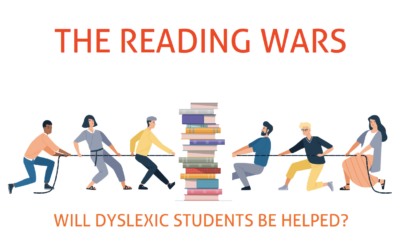Dr. Jean-Luc Velay was kind enough to share his paper called E-book reading hinders aspects of long-text comprehension for adults with dyslexia. The paper's an important read as there is substantial evidence that reading on a screen and reading a printed book is not...
READING FLUENCY: Phrase Cueing [Premium]
Once students have made significant progress with single word decoding, reading fluency practice can be rolled into reading practice with phrase cueing. HERE is a nice review of reading fluency approaches that includes a discussion of phrased reading. Phrase scooping or cueing involved the drawing of scoops underneath groups of words that go together in parts of a phrase. Combining scooped words with choral reading or echo reading can help students get practice with both reading and listening for phrases. Intervention Central has a Phrase Cued Text Generator, but it’s so-so. It’s better to break sentences into 3-6 word phrases to increase the ease of reading. From Steve Peha, check out the example below: Of course these shorter phrases also help with reading on a […]
Chat with Jack Churchill, Winston’s Great Grandson & Co-Founder of SCANNING PENS
Jack Churchill, Winston Churchill's great grandson also graciously took time out his busy schedule to talk with us about his wonderful scanning pens that are now taking the dyslexia world by storm. Scanning Pens is also one of Dyslexic Advantage newest sponsors - so...
Cultivating a LOVE of Reading
Q: Is it possible? A: Yes it is. The Cult of Pedagogy explored this topic from an opposite point of view, but the challenge is a formidable one, especially if a reader is dyslexic. GOOD THINGS TO DO Allow kids time to read for enjoyment. Let them choose their...
SENSING SHAKESPEARE: New Book of Teaching Strategies
This book has wonderful strategies and examples that will be helpful for many dyslexic actors and actresses, but also middle, high school, and college students who are tasked with reading complex texts. Listen to my interview with Petronilla here: "For me, as a...
The Reading Wars: Will Dyslexic Students Be Helped?
"Over the long term in reading, the lowest performing students – those readers who struggle the most – have made no progress from the first NAEP administration almost 30 years ago..." There are discouraging reports from the 2019 NAEP Reading Assessment. NAEP stands...
Dyslexia | How to Choose Books | Premium
How Can We Help Dyslexic Students Choosing Books? Here are a Few Tips… Say Yes as Often as You Can Dyslexia by its very nature presents with a gap between intellectual or conceptual ability and reading, so it’s like that sometimes student will want to choose a book much higher than his or her reading level, whereas at other times, surprisingly pick a book much lower than their intellectual ability would predict. What your student is doing is selecting a book for a particular purpose. Higher level books feeds their intellectual hunger, while the lower book helps them skill build – for students who want to really master reading not just get the gist. Preview Books and Read Together If the book is a reach book, then consider previewing or chatting about […]
Dyslexia and the NEW SAT [Premium]
The new SAT started March 2016. From the New York Times, “What’s true of the writing section is true of the new SAT in general: There’s much more to read. “The most fundamental change is that there are many, many more words,” said Aaron Golumbfskie, education director for PrepMatters. “If you don’t read well and happily, this test isn’t going to be your friend.” Even the math section will require more reading, with fewer questions based on equations and more word problems. Some prompts will present the same type of real-world situations that the Common Core emphasizes — “The recommended daily calcium intake for a 20-year-old is 1,000 milligrams (mg). One cup of milk contains 299 mg….” Mr. Golumbfskie describes the math section as “tighter […]
Helping Severe Dyslexia – Part 2 Word Learning and Vocabulary [Premium]
In our previous post on Severe Dyslexia, we talked about 6 steps required to read: 1. Seeing 2. Visual Recognition of Words 3. Matching Letters and Words to Sounds – Phonemic Awareness 4. Matching Words to Word Meaning 5. Saying Words 6. Comprehending Text In that post, we talked about how different readers may have difficulty with the visual aspects of reading, whereas others have trouble with sound. Other areas where children or adults can have trouble are in the areas of learning and remembering word meaning, speech output, and finally reading comprehension in text form. It’s important to be able to target these areas because it helps prioritize needs and also could explain while more progress isn’t being made. One student may need intensive remediation in […]
How Dyslexia Changes at Different Ages [Premium]
With all of the advances in our understanding of early intervention, dyslexia in older students and young adults often gets short shrift. The paper by Dr. Kathleen Niesen and colleagues has some interesting findings that have important points for identification, accommodations, and understanding of both the challenges and strengths of adolescents and young adults with dyslexia. Importantly, the authors made this point: “…if dyslexia was not diagnosed earlier in schooling, young adults do not qualify for accommodations even if as adolescents and adults they meet research criteria for dyslexia on evidence-based assessment. Such assessment practices do not seem fair or sensible or consistent with the spirit of the Americas for Disabilities legislation.” The point made was that dyslexia missed in the early grades usually meant dyslexia […]
Breaking Research : Dyslexia in Adolescents and Adults [Premium]
An important paper was published this month from the University of Washington, entitled “Evidence-Based Reading and Writing Assessment for Dyslexia in Adolescents and Young Adults.” The paper is especially important guiding testing professionals who assess teens and adults for dyslexia or see gifted or twice-exceptional students. This paper also takes a more systematic look at the roles of individual factors like working memory and executive function on dyslexia and reading and spelling performance. The data will be helpful in targeting educational interventions and can also guide requests for testing accommodations. There are interesting observations too in that paper that will help with characterizing the strengths that occur among adolescent and adult dyslexics, with implications for twice-exceptional or gifted students with dyslexia. In several areas, adolescent / adult […]
Connecting the Dots
"It’s refreshing to read about someone else so successful that thinks like me because of how their brain is wired, which has often only been seen as a learning disability. I’ve always known I had a different way of seeing the world which became more apparent when I...


![READING FLUENCY: Phrase Cueing [Premium]](https://www.dyslexicadvantage.org/wp-content/uploads/2020/01/phrase-craze-3-400x250.jpg)





![Dyslexia and the NEW SAT [Premium]](https://www.dyslexicadvantage.org/wp-content/uploads/2016/02/new-sat-dyslexia-pencil.jpg)
![Helping Severe Dyslexia – Part 2 Word Learning and Vocabulary [Premium]](https://www.dyslexicadvantage.org/wp-content/uploads/2015/12/severe-dyslexia-part-2.jpg)
![Breaking Research : Dyslexia in Adolescents and Adults [Premium]](https://www.dyslexicadvantage.org/wp-content/uploads/2016/02/Screen-Shot-2019-10-08-at-4.23.50-PM.jpg)














